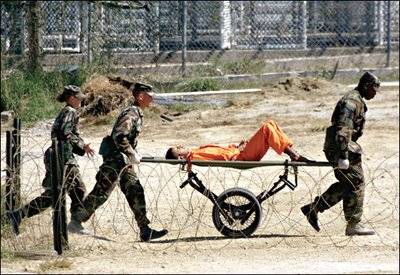 Oliver Kamm is a deeply misunderstood man. Just because he's around the only supporter of the war in Iraq outside of government not to recant their support or at least admit they got it somewhat wrong doesn't mean that he's stubborn and wilfully blind. Just because he tried to convince us all that Hiroshima and Nagasaki weren't crimes doesn't mean that he's someone who wants to rewrite history with a view to the current war on terror. Just because he wrote a piece calling for "concerted diplomatic pressure, sanctions and luck" over Iran's nuclear programme on the same night as the NIE intelligence statement was published that said that Iran had abandoned its efforts to build a bomb in 2003, leading to him hastily redrafting his opinion doesn't mean that he's the equivalent of a musical hall joke. And just because his latest effort, delivering the most rancid apologia for the rendition programme you're ever likely to read, doesn't mean that in the words of some on CiF, he's a man with a revolting worldview, it also doesn't mean that he's not the most pathetic muscular liberal around. That would be Nick Cohen.
Oliver Kamm is a deeply misunderstood man. Just because he's around the only supporter of the war in Iraq outside of government not to recant their support or at least admit they got it somewhat wrong doesn't mean that he's stubborn and wilfully blind. Just because he tried to convince us all that Hiroshima and Nagasaki weren't crimes doesn't mean that he's someone who wants to rewrite history with a view to the current war on terror. Just because he wrote a piece calling for "concerted diplomatic pressure, sanctions and luck" over Iran's nuclear programme on the same night as the NIE intelligence statement was published that said that Iran had abandoned its efforts to build a bomb in 2003, leading to him hastily redrafting his opinion doesn't mean that he's the equivalent of a musical hall joke. And just because his latest effort, delivering the most rancid apologia for the rendition programme you're ever likely to read, doesn't mean that in the words of some on CiF, he's a man with a revolting worldview, it also doesn't mean that he's not the most pathetic muscular liberal around. That would be Nick Cohen.
Kamm builds his entire fallacious argument around the fact that in modern terms, the abduction by Mossad of Adolf Eichmann, who was subsequently put on trial and hanged, would fall under the reference of an "extraordinary rendition". This much is probably true. There though the similarities with modern cases end. Eichmann, unlike those currently at Guantanamo Bay who were rendered there, including the most high profile detainees, such as Khalid Sheikh Mohammed, faced a fair trial, which was not held under military auspices. Nor was he at any point subjected to anything ever even slightly amounting to torture, which many of those who have been through the rendition system allege, and often have the scars and mental health problems which do much to substantiate their claims. Argentina, although originally outraged by the breach of its sovereignty, eventually made something approaching a deal with Israel, and withdrew its original allegations and claims.
Kamm goes on:
They involve the detention of a suspect in one country and their transfer to another by the CIA. There are good reasons that the first country might wish to take this course. It might not have a legal system capable of disinterestedly dispensing justice, owing to the threat of intimidation. There might be domestic political reasons for the government to be reluctant to cooperate too closely with the United States.
None of these factors however apply to the rendition of Abu Omar from Italy, to bring up just one example. Italy had a perfectly good relationship with the United States at the time of his rendition, yet the CIA felt it necessary to kidnap Hassan Mustafa Osama Nasr and rather than take him back to the United States, where he could be tried for any of the allegations made against him, they instead took him to the democratic outpost of Egypt, where he claims he was tortured. The question has to be to any doubters of just what the point of the rendition programme is: why take him to such a country where torture is endemic if the CIA expressly does not torture those in its custody?
Another example is that of our own Jamil el-Banna and Bisher al-Rawi. Both had some connection to the radical preacher Abu Qutada, sometimes called al-Qaida's spiritual leader in Europe, but both were intending to leave the country and set up a business in Gambia. Just before they left, el-Banna was visited by an MI5 officer that offered him to become an informer; he declined. al-Rawi is already said to have been informing MI5 of Abu Qutada's movements. Despite promises that they would be allowed to leave the country without hassle, they were stopped at the airport, and only allowed to fly later. On their arrival in Gambia they were detained, ostensibly on the reason that they were carrying bomb parts, which were in fact a battery charger, handed over to the CIA and taken to Guantanamo. Both have now been subsequently released, but el-Banna especially shows the scars of his ordeal: a Spanish judge dropped his request for his extradition on humanitarian grounds after a medical report found that
Banna is said to be severely depressed, suffering from PTSD, and to have diabetes, hypertension and back pain, as well as damage to the back of his left knee.
Kamm though isn't interested in these individual case studies of what those rendered have been through, with no apology for the treatment meted out to them beyond either domestic or international law from those responsible. He says he is both opposed to the death penalty and to torture, but those soon to go through the military tribunals at Gitmo can be executed, and we also know for a fact that at least three of the top-level detainees have been tortured. Rather, he's off on another rhetorical tangent; suddenly, bin Laden comes out of nowhere:
What they would have advised if Osama bin Laden had unaccountably declined to turn himself in was never put to the test. Had the CIA abducted Bin Laden from Afghanistan in the late 1990s (a course whose feasibility the agency investigated), some great crimes might have been averted.
The hypothetical kidnapping of Bin Laden illustrates two problems with the absolutist rejection of rendition. First, the Taliban regime in Kabul would no more have handed over Bin Laden in response to an international summons than it would have handed over Lord Lucan. Second, the evidence against a terrorist suspect might be circumstantial or partial. It might not be of a type admissible in court. I do not know if this is true of Bin Laden and the destruction of the twin towers. But I know he did it, and I want him stopped.
True, some great crimes might have been averted, but we don't know that for certain. 9/11 was long in the planning, and we know that Khalid Sheikh Mohammed was one of those personally in charge of those who became the hijackers. Unless both had been captured we simply don't know whether the attacks would have been stopped or not.
Kamm's two points are similarly contentious: first, there is some evidence that the Taliban may well have turned over bin Laden, as the links between the two were not as solid as they now are today, but that they weren't given enough time. Secondly, Kamm's points about bin Laden fall apart because he seems to have completely forgotten about the bombing of the US embassies in Kenya and Tanzania in 1998 and then the USS Cole bombing in 2000, both of which were the work of al-Qaida and were already being linked to him far before 9/11. As the Looming Tower by Lawrence Wright testifies, even after these attacks most of the US security apparatus still hadn't woken up to bin Laden. It was only a dedicated few who were trying to stop him and spread the word, but the US missed its chance. Moreover, if bin Laden had been captured between 1998 and the beginning of 2001, under the Clinton administration it seems less likely that he would have been tortured or mistreated, which is one of the major sticking points over rendition.
This is all part of Kamm's diversionary tactic however. He points towards Adolf Eichmann and bin Laden because he wants to take the reader's mind off the fact that overwhelmingly the rendition programme has not dealt with the most serious terrorists, but rather with those at the lowest levels or those completely innocent of any crime, or certainly not convicted of any. Kamm does stop himself for a moment and say a few conciliatory words:
Rendition is justifiable because it interdicts terrorists, and terrorism is not merely a problem of law enforcement. The particular controversy over rendition concerns torture, and on this point European objections are on firmer ground. The US is a signatory to the Geneva conventions against torture, yet terrorist suspects have been sent to countries that are guilty of human rights violations and have used torture.
Torture is wrong and does not work. As Christopher Hitchens has put it, torture is practised by those "whose whole outlook is based on stupidity and coercion, and you can bet that even with a ticking bomb nearby they would be busily gang-raping the wrong guy".
So why then is Kamm going to such lengths to defend a practice which has used torture endemically, as well those countries which Kamm himself is opposed to which have used torture? He doesn't explain, quite possibly because he doesn't have an answer to that. There's one thing he does do though, and that's defend the United States and the "war on terror" to the death if necessary, however many of his own "red lines" it breaches.
There is an important role for Britain, whose commitment to the war on terror (a phrase I use without irony because it is accurate) is beyond dispute, to intercede with the US administration. There should be no rendition to autocracies whose word on the issue of torture is untrustworthy, such as Syria. Renditions should be used only in extreme cases, against those suspected of directly plotting terrorist acts. The country to which they are transferred must exercise due process under its own laws.
This is all well and good, but this is missing the biggest factor in the whole argument. The United States itself is not exercising due process under its own laws to those in Guantanamo Bay. They're instead defined as "enemy combatants", are not subject to the Geneva convention, and are being tried by military commissions which cannot possibly provide a fair trial. Most of them have been tortured during their interrogations. This breaks every rule in the book, but then the war on terror, which Kamm nobly uses without irony, has from the very beginning held every national and international law in utter contempt. The fact is that we shouldn't be involving ourselves in renditions full stop, except to make clear our firm opposition to anyone being kidnapped by the CIA. If they want someone on these shores, they can make an extradition request, as they have done over Babar Ahmed for example. They can do the same elsewhere, and go through international channels over other individuals they seek, as everyone else has done and continues to do. It's only Israel and the US that seem to consider themselves above such things.
But Europeans have a responsibility too. We are the beneficiaries of American efforts to disrupt terrorism. Diplomacy on the issue of rendition should deal with anticipating and preventing abuses. It should not be an opportunity for hyperventilation on the identity of the hated Bush-Cheney regime and our declared theocratic enemies.
No Oliver, that's what you consider our responsibilities to be. Have any of the renditions prevented attacks on our soil? Despite Bush's claims that they foiled an attack on Heathrow through one of them, something which our own authorities seem bemused by, there is no evidence whatsoever to substantiate that they have. They have however summarily kidnapped and held both British citizens and those with leave to remain outside the boundaries of international law, and considering not one individual was ever charged with any crime, regardless of what they have since admitted to doing or taking part in, I think that might well give the rise to "hyperventilation" at the injustice they have suffered, not to mention the actual bodily harm or mental scars that have gone with it.
So concludes then a highly confused, contradictory piece which suggests Kamm himself doesn't really know what he thinks. He loathes torture, yet justifies a practice which has used it and will likely use it again. He is a huge believer in "the war on terror", yet turns a blind eye to the worst excesses of it, going so far as to defend the biggest insult there could be to the liberal values he so espouses, the one sitting on an island which has itself resisted the US for nearly half a century. Some might think this makes Kamm intellectually dishonest; rather, it's just Kamm doing what he's always done, saluting capital and the stars and stripes and ignoring anyone who tells him that everything isn't just fine and dandy.Labels: bullshit, fisks, Guantanamo, Oliver Kamm, rendition, torture





